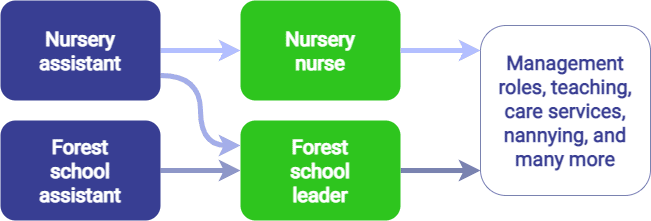How to Become a Nursery Nurse
Interested in starting a career in childcare? Our guide is here to help you figure out how!
Table of Contents
Step 1: Learn about a nursery nurse's role and responsibilities
Being a nursery nurse (also known as a nursery nurse) can be a hugely rewarding job as you’ll be working to support all kinds of children in their formative years. As a nursery nurse, you’ll be working with babies and young children up to the age of five years old, and as part of the role you’ll be undertaking a wide range of responsibilities from childcare to administrative duties.
Here are some of the key responsibilities you’ll likely deal with as a nursery nurse:
- Supervising and monitoring the children under your care. More than just health and safety, you’ll have safeguarding obligations to help ensure children are safe both at your workplace and in their home life.
- Reading stories to the children you work with to help develop their language skills as well as helping them to learn number skills through the use of games and other activities. You’ll be preparing all kinds of activities throughout the day to keep children engaged.
- Observe children’s progress and how they’re developing, looking out for any issues that might arise. It will be part of your job to ensure children are progressing in the best ways they can, and you’ll be working with parents to help achieve this.
- You’ll be responsible for caring for children by preparing their food and ensuring a clean environment, as well as helping babies and younger children when they need changing.
When you'll be working
As a nursery nurse when you’ll work might vary. Most nurseries don’t follow typical school term times but there are some exceptions, so you might only be working in term time.
What kind of salary does a nursery nurse earn?
The average salary for a nursery nurse is £19,000 but depending on your region and experience you could be earning more or less, with nursery nurse salaries ranging up to around £25,000. If you’d like to learn more then see our information page on how much a nursery nurse earns.
How you could progress as a nursery nurse

If you want to know how you could progress, take a look at some of our other career advice pages and find out what you’ll need to get where you want to be!
Step 2: Improve your chances of getting a position as a nursery nurse
If you’re comfortable with the responsibilities of being a nursery nurse, then you’ll need to ensure that you have all of the necessary skills and qualifications for the position and understand what exactly you can do to help yourself get started in an early years setting.
You’ll need to meet the requirements for the job role, as well as the more specific requirements that many organisations have for their potential employees which can vary from job to job. There are a few things that you can do to improve your chances when you’re looking to enter a career in childcare.
Enrol on a Level 3 Childcare course
In order to qualify as a nursery nurse, you’ll need to have a recognised level 3 qualification in childcare. As part of the qualification, you’ll understand the requirements of a childcare setting and gain a better understanding of the skills you’ll need to care for babies and young children, as well as the responsibilities that might entail.
You could also need an A* to C grade at GCSE level in English and Maths or equivalent, depending on the workplaces you apply for. If you don’t have either one or both of these you should look at taking either a Level 2 Functional Skills English course or Level 2 Functional Skills Maths course. A functional skills qualification is equivalent to having your GCSE qualification at this level, and can help you get into a wide range of jobs, not just in childcare.
To prepare for a Level 3 Childcare course, taking our Level 2 Childcare course is an ideal way to increase your chance of being enrolled. If you already have your level 3 qualification then you can move onto the next steps!
Check Out Our Level 2 Childcare Course Now!
Need a little something extra for your CV? Our Level 2 Childcare Course will be perfect for you! Get the knowledge you need to excel in a childcare setting.
Get some supporting qualifications valuable to the job
Though not essential, having supporting qualifications can really improve your chances of getting the position that you want and help you to stand out among other applicants. Getting your supporting qualifications will let you demonstrate additional knowledge that other candidates might not have.
For a nursery nurse there are a number of supporting qualifications that could be helpful. A safeguarding and prevent course is going to equip you with the knowledge you need to help safeguard the young children you’ll be caring for which is a hugely important part of the job. Employers, as well as parents, are going to feel confident knowing you have the knowledge you need to support the organisation’s safeguarding responsibilities to a higher level.
In early years work it’s important that you have a first aid qualification in case of minor injuries that the children might end up with. Depending on the employer you might be given the option to receive this training before starting work but having the qualification beforehand can help put you ahead.
You could also look into a qualification in understanding autism. Having a greater understanding of autism and how it affects children could be very beneficial depending on the children you’ll be working with. Even if you’re not working in a specialised setting, having the knowledge is likely going to help in your position as autism affects 1 in 100 people in the UK, which could include some of the children you’re going to be caring for.
Gain some experience that will help you in early years work
Any experience working in a childcare setting will be invaluable to you when you’re looking at getting a position as a nursery nurse. This experience could range from anything from babysitting to work as a nanny.
The most valuable position you could work in before starting as a nursery nurse is as a nursery assistant. Nursery assistants have less responsibility than a fully qualified nursery nurse but it’s a position that will give you an idea of the work environment that you can expect, as well as experience in some of the responsibilities that you’ll be dealing with as a nursery nurse.
If you don’t have any prior experience in a childcare environment then it’s good to highlight the transferable skills you’ve got from other work that will help you transition into a childcare environment. If you’re looking to work with children with special educational needs or in a more specialised setting it’s a good idea to look for relevant work or volunteering opportunities.
Typical weekly hours
As a nursery nurse you could be working around 38-40 hours a week depending on your nursery and responsibilities.
Step 3: Make sure your CV is up-to-date
You should make sure your CV includes your most up-to-date information, including any relevant qualifications and work experience you might’ve gained since you last updated it. It’s important to present yourself as best you can. For help and tips with writing your CV check out our nursery nurse CV guide.
Step 4: Search for nursery nurse jobs you can apply for
Searching for an early years position should be simple, and shouldn’t be any different from finding other jobs you’ve applied for before. Just make sure that the positions you apply for are a good fit for you and that you have all the necessary qualifications and you should have no trouble! Checking out our job board could be a good start for your search.
Step 5: Write a job-specific cover letter
You should write your cover letter using the job description of the vacancy you’re applying for. For more tips on writing your cover letter check out our nursery nurse cover letter page. Once you have written your cover letter you could even use it to apply for other nursery nurse roles.
Step 6: Prepare for interviews
We all know that job interviews can be nerve-wracking, but being well prepared for the interview will help you to appear calmer and more confident. It might seem obvious, but make sure that you always present yourself professionally at interviews, dress well, and always be polite. First impressions can make or break your chances!
You should prepare yourself for the questions commonly given to nursery nurses at interviews. There are some great online resources that can help you out, and give you an idea of what you can expect. Have a look at our own nursery nurse interview questions if you need some ideas. Take the time to plan how to answer them in the interview but don’t rely on them, as anything could come up!
Now let's recap...
Step 1
Learn about a nursery nurse’s role and responsibilities
Step 2
Improve your chances of getting a position as a nursery nurse
Step 3
Make sure your CV is up-to-date
Step 4
Search for nursery nurse jobs you can apply for
Step 5
Write a job-specific cover letter
Step 6
Prepare for interviews
Step 1
Learn about a nursery nurse’s role and responsibilities
Step 2
Improve your chances of getting a position as a nursery nurse
Step 3
Make sure your CV is up-to-date
Step 4
Search for nursery nurse jobs you can apply for
Step 5
Write a job-specific cover letter
Step 6
Prepare for interviews
Final Note
After reading through our guide, you should be ready to embark on a new career in childcare with the confidence you need to excel. If you follow our tips then you’ll be more than ready to get the job role you’ve been looking for! Good luck, and if you need any more advice on other career options, don’t forget to take a look through our career advice page.
